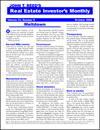John T. Reed's analysis of Catherine Nomura & Julia Waller's book
Unique Ability


(This article first appeared in Real Estate Investor's Monthly.)
Book review: Unique Ability
A subscriber who read my Succeeding book gave me a copy of the book Unique Ability by Catherine Nomura and Julia Waller. I was shocked at how similar it was to my book in many respects. I had never heard of or seen the book before. And I have no reason to believe its authors saw my book before they wrote theirs. My book came out in 2003. Theirs was first copyrighted in 1995.
They use different terms which is a good thing. In the course of coaching 800 young men in football and baseball I learned one of the things teachers know, that is, the more different ways you can explain things, the better, because different people understand different explanations.
Unfortunately, the book has some hype and psychobabble. Not too much. I have seen much worse. For example, the always capitalize the phrase Unique Ability and sometimes put an ® after it indicating they own the phrase.
The idea of the book is that each of us has a unique set of strengths and that we should work in the ideal situation for that set. They break it down into four levels: sort of strong strengths, weak strengths, not-so-bad weaknesses, and bad weaknesses. They describe how you feel when you are in a job at each level. For example, when you are in a job that emphasizes your strong strengths, you are happy, lose track of time, love to go to work, get many compliments, and so forth.
The book opposes trying to fit in, as do I. As I did, they recommend some tests of aptitude and such, only they recommend different ones that I had not heard of: Kolbe A Index and StrengthsFinder Profile. Probably worth investigating.
They also have their own step-by-step process for examining your own life to find your strengths. I liked all of it except for their Unique Ability Statement. Many of their examples and instructions are way too vague for me. For example, “My
Unique Ability is to empower others to be confident in themselves and experience the joy of new possibilities.” Generally speaking, you should leave the room whenever you hear the word “empower.” It’s usually accompanied, including in this book, by using the word “grow” to mean increase the size of as in “grow your business.” Very trendy.
Unique Ability is big on delegating and partnering to get strengths that your economic activity needs but that you do not personally have. In theory, that makes sense. But my impression is that delegating means employees and employees are a very big complication to bring into your business or life. I would rather you outsource the activity in question to a subcontractor. If you can’t do that, change your business so you no longer need the activity in question.
Similarly, I oppose group ownership including partnerships, etc. Unique Ability offers an interesting perspective that did not occur to me. They say that many people stop themselves from succeeding because they don’t think they deserve it, don’t want to outshine their peers, guilt about enjoying what is supposed to be “work” and therefore not fun, comfort with a decent but not optimal career fit, wasting time trying to fix their weaknesses, inability to delegate, unwillingness to trust others, fear of criticism from strangers who would become aware of them if they became prominent, escapee (from Dilbertland) guilt.


These are extremely interesting. Generally, I do not suffer from them so I did not think of them as obstacles. I did, early in my career, think more qualified people should be doing the things I ended up doing. But no such people showed up. I discussed that at length in my book.
Not wasting time to correct weaknesses is a great point. Some weaknesses can be corrected, like physical weakness or obesity. But most weaknesses are inherent in you. The correct response to them is not to try to eliminate them but to put yourself in situations where they are irrelevant or insignificant.
Trust is another good point for team situations. As a football coach, I discovered that quarterbacks and receivers must trust each other. If the quarterback does not trust the receiver to run the right route, he will not throw on time or accurately. Similarly, if the receiver does not trust the accuracy and timing of the quarterback, he will run in a way that allows him to adjust to inaccurate or late throws, but which slows him down and makes him easier to cover. Trust does not come out of thin air. The person whom you trust must be trustworthy. You need to build that up gradually through practice or other time together. JTR